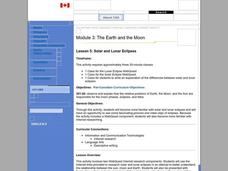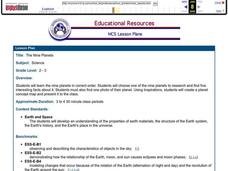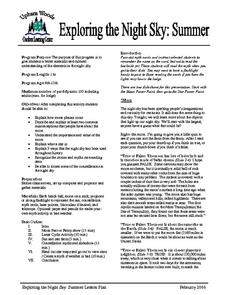Big Kid Science
Create Dynamic Art Using the Eclipse!
What happens to light as it passes through a hole? This is the main question centered around the designing of a solar eclipse dynamic art piece that uses a solar eclipse and paper to create a pinhole projection of the art.
K12 Reader
Solar Eclipse
A passage about solar eclipses provides readers with an opportunity to demonstrate their ability to identify the main idea and supporting ideas in an article.
Curated OER
Solar and Lunar Eclipses
Students examine eclipses. For this eclipse lesson, students investigate solar and lunar eclipses. Students complete a WebQuest and write a descriptive summary of eclipses. Lesson references a WebQuest, but does not include a link.
Curated OER
Solar and Lunar Eclipses
Learners complete a WebQuest in order to better explain solar and lunar eclipses. They observe images and videos of eclipses from around the world.
Curated OER
The Nine Planets
A solid instructional activity on teaching the nine planets in our solar system is here for you. In it, young scientists learn the correct order of the planets, and they choose one of the planets to do a research report on. They must...
K5 Learning
The Moon
Second graders read a short informational text passage about the moon and answer a series of questions based on what they read.
Curated OER
The Reasons for the Season
Students explain the reason for the changes in season. In this instructional activity examining the relationship between the Earth and the Sun, students use an applet to discover how the alignment of the Earth and the Sun cause the...
Curated OER
Tangerine: Concept/Vocabulary Analysis
Designed for teachers who use Tangerine in the classroom, this resource provides background information on the novel, issues raised by the story, and literary devices Bloor employs. A good addition to your curriculum library.
Curated OER
Exploring the Night Sky: Summer
Learners explain how moon phases occur. They describe and explain at least two common misconceptions that people have about the moon. Students explain what a star is. They explain 3 ways that the night sky has been used throughout history.
Curated OER
Exploring the Night Sky: Fall/Winter
Students explain how moon phases occur. They explain three ways that the night sky has been used through history. Students locate some of the constellations in the night sky. They discuss stories and myths surrounding stars.
CommonLit
Common Lit: "What Is an Eclipse?" by Nasa
CommonLit.org is a wonderful resource to use in a Language Arts classroom. Each story or article is accompanied by guided reading questions, assessment questions, and discussion questions. In addition, students can click on words to see...
Smithsonian Institution
National Postal Museum: Art of the Stamp: Benjamin Banneker
View the artwork of Jerry Pickney honoring Benjamin Banneker on a stamp. Banneker predicted a solar eclipse, published farmers almanacs, and was famous for many more things.













